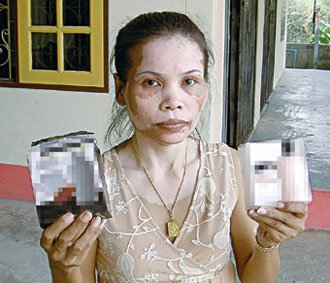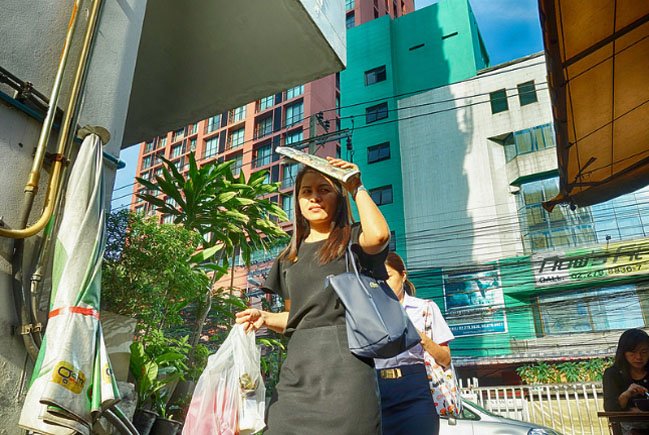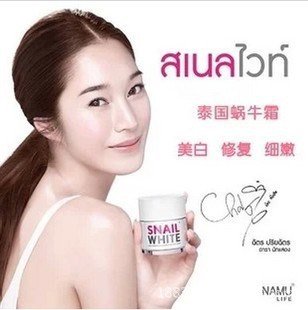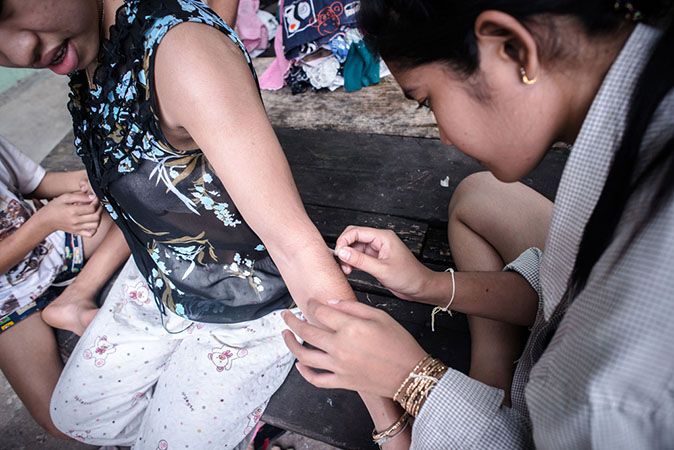White Skin still the aim of the game for most Thai people
From sketchy creams that promise a lightened vagina to deodorants that cure dark armpits to intravenous skin-lightening injections, the market for white skin products is extensive in Thailand.
For many Thais, light-skinned women are considered more beautiful and believed to be more successful. Behind this idea are cultural beliefs and a multi-million dollar industry that seems to have no end to the weird products they can create to make random body parts paler.
The cultural obsession with white skin means that many Thais avoid the sun in their daily lives. Thai language is also peppered with expressions that equate dark skin with unpleasant things, such as the insult “dam muean ega” meaning “black as a raven.”
Namwhan, a 27-year-old Thai woman, explained that she refuses to go swimming for fear that her skin will become darker. She also uses a special face serum and whitening body lotion to lighten her skin.
“My sister used to tell me I looked dark, but I wanted to be white like a Korean girl because they look so healthy. In Thailand, many light-skinned actresses and actors are successful at their jobs,” she explained.
The idea that whiteness of the skin is healthy is repeated by many Thai women.
“For me, white skin is bright and healthy skin,” said 23-year-old Sakaowtip. When asked why a whitening body lotion will give her a healthier appearance, she replied, “It has moisturizer.“
Other Thais just consider pale skin more appealing.
“Light skin is more beautiful than dark skin. In Thailand, it is very sunny, and I protect myself with sun creams,” says 40-year-old Tanita.
The so-called whitening products commonly found in department stores are regulated, but there are many illegal creams and soaps that continue to be sold on the black market, and they contain dangerous ingredients for the skin such as hydroquinone and mercury.
“Hydroquinone can cause intense irritation of the skin and leave the user with uneven bleaching and a condition called cutaneous ochronosis, which is a bluish-black discoloration of the skin”, explained Lisa Bickerstaffe, spokesperson for the British Skin Foundation, a charity in the UK that raises money for research and awareness.
“Using products that contain mercury can lead to increased pigmentation, fetal abnormalities, if used during pregnancy, and severe and itchy rashes. In high doses, they can also cause psychological damage,” she said.
The last ad scandal that involved whitening products was by whitening pill brand ‘Seoul Secret’, the campaign implied that dark skin would cause a woman to fail in her career. The firm pulled the commercial from YouTube after it received a barrage of criticism on social media.
The star of the ad was Cris Horwang, a well-known Thai singer, model and actress, who pointed out that her clear complexion was what led her to fame.
“To get where I am today, the competition was tough. If I stopped taking care of myself, everything that I worked for, the whiteness I invested in, would be all gone,” Cris said in the commercial.
The slogan of the ad was: “Being white makes you win,” the company claims that their product contains a kiwi seed compound that will help you “not turn dark”.
This isn’t the first time a Thai ad has drawn accusations of racism or classism in Thailand. In 2013, an ad for a skin whitening cream called ‘Citra’ a subsidiary of Unilever, suggested the company would offer scholarships to students with fairer skin.
The ad was set on an university campus and showed two female students, one pale and another darker-skinned, who were asked what could make them “outstanding in uniform.” The darker-skinned girl appeared confused by the question and said that she didn’t know. The fairer one, presented as more beautiful, answered that using Citra products could help.
Despite unending attempts by Thai people to achieve whiter skin, a pigment known as melanin determines the color of skin, hair and eyes, said Dr. Emma Wedgeworth, a consultant dermatologist and British Skin Foundation spokesperson.
“Cells within our skin, known as melanocytes, produce this pigment. The amount of melanin produced by the skin varies significantly in amount and type from person to person. The more melanin a person produces, the darker their skin,” she explained.
The amount and type of melanin you produce is genetically predetermined. The more melanin your skin produces, the better protection your skin has against UV rays and the lower your chance of developing skin cancer.
“Generally, individuals who have originated from nearer the equator will have more melanin and darker skin, because their ancestors have slowly adapted to the harsher sun in those areas,” added Wedgeworth.
Despite this, the color of the skin has long been culturally associated with social class in Thailand, explained Thai media and sexuality scholar Jaray Singhakowinta.
The popular preference for white skin is often thought to be a 19th century ideal imported from the West but this preference for white skin is, in fact, Indian in origin. The Indian subcontinent had great influence over Thailand, both religiously and culturally during the Ayutthaya period, approximately 600 years ago.
“White or pale skin is believed to indicate a higher social class as these people can afford indoor lifestyles and have the working class labor for them,” said Jaray.
The European colonization of Thailand’s neighboring countries in the 19th century and the more modern influence of Korean beauty ideals have “helped intensify this historical and cultural whiteness obsession,” she said.
Looking toward the future, research firm Global Industry Analysts predicted that the global skin whitening market will grow to USD23 billion by 2020. Asia-Pacific revenue will continue to be significant and will increase by 11.2 percent each year.
Thai society has been progressively developing acceptance of natural skin color in the past few years, but there is still a long way to go.
Tan Magazine entered the market last year and celebrated beach culture and healthy tan skin. Its creator explained that the idea was to inspire readers to engage in activities without worrying about the sun’s rays.
In 2014, a Southern belle with tan skin, Nonthawan “Maeya” Thongleng, won the Miss Thailand World contest. Local media soon called her the Thai “Pocahontas,” and she became an inspiration for young Thai women who do not have light skin.
These thoughts about embracing natural beauty are juxtaposed by ideas portrayed by whitening product ads that attempt to equate beauty with race or class. These could be dangerous, pointed out Jaray.
She said that creating this whitening mindset fits well with capitalist culture since it makes money by creating a market out of unnatural or unattainable desires.
Credit: Bangkok Coconuts








